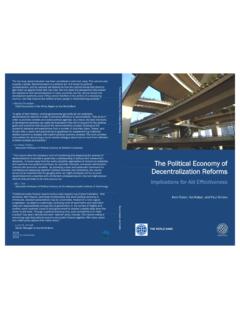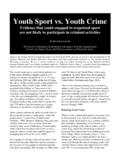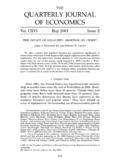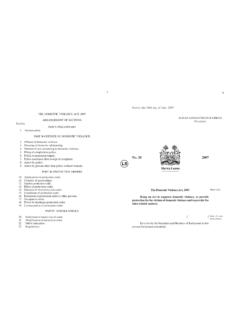Transcription of CHAPTER 6: CRIME AND ITS IMPACT ON BUSINESS …
1 CHAPTER 6: CRIME AND ITS IMPACT ON BUSINESS IN JAMAICAI. INTRODUCTION CRIME AND DEVELOPMENT Jamaica has the one of the highest rates of violent CRIME in the world, but a relatively low rate of property CRIME . In 2000, the recorded intentional homicide rate was 33 per 100,000 inhabitants, lower only than Colombia (63) and South Africa (52). In terms of recorded major assaults, Jamaica experienced 215 such incidents per 100,000 (665 in South Africa, 95 in Dominica). Recorded drug offences are also among the highest in the world, at 452 per 100,000 (370 in Dominica, and highest at 987 in Norway).
2 In contrast, property crimes are relatively low in Jamaica: recorded burglaries occur at a rate of 92 per 100,000 (1777 in the Dominica, 922 in South Africa, 134 in Mauritius), and total robberies at 89 per 100,000 (78 in Dominica, 460 in South Africa, 98 in Mauritius). In the aggregate, Jamaica experienced a relatively lower 1488 total recorded crimes per 100,000 in 2000 (10763 in Dominica, 7997 in South Africa, 3030 in Mauritius, 1289 in Costa Rica), since non-violent crimes are fewer in Jamaica, but where there is also significant under-reporting owing to low clear-up rates. A high rate of violent CRIME can have many adverse repercussions:1 It has a negative IMPACT on the investment climate and can deter or delay both domestic and foreign investment, and hence growth.
3 2 It leads to higher cost of doing BUSINESS , because of the need to employ different forms of security, and diverts investment away from BUSINESS expansion and productivity improvement, and may lead to a less than optimal operating strategy. 2 It leads to BUSINESS losses, arising from looting, arson, theft, extortion and fraud. 3 It leads to loss of output because of reduced hours of operation (including avoiding night shifts) or loss of workdays arising from outbreaks of violence, and avoidance of some types of economic activity. 4 It also reduces output because of the temporary (from injury) or permanent (from murder) exit of individuals from the labor force.
4 In the latter case, the loss is not just current output, but the output in the remaining years of the individual s working It can also cause a permanent shut-down of firms or relocation to less CRIME -prone countries. 2 It erodes the development of human capital as well as social capital and thus constrains the potential for growth. The CRIME situation in Jamaica seems to be an important reason for migration, since the fear of CRIME significantly reduces the quality of life. CRIME and violence have also been blamed for slowing down the rate of return of migrants back to Jamaica. Also, CRIME forces otherwise productive individuals to occasionally exit the labor force because of violent injury to themselves or close associates, or because of social unrest in the community.
5 Violence in some communities also causes schools to close periodically. Moreover, home and community instability is not conducive to learning and educational objectives. 3 It diverts public resources excessively away from productive uses that have a potentially much higher IMPACT on social development and growth, to areas such as police, justice, the medical system (for treatment of violence-related injuries and trauma). For example, between 1988/89 and 2001/02, Jamaica s budgetary expenditure for health, in nominal terms, grew 23 percent annually, whereas the budget for national security and justice grew by 62 percent.
6 Since 1999, the budget for Justice and Correctional Services plus the Police has exceeded the budget allocation for health (PIOJ, various issues). For private citizens, it also diverts resources away from potentially useful expenditures like education, to spending on treating injury and on private report estimates that the direct cost of CRIME in Jamaica is at least percent of GDP (2001 data), and this does not include the IMPACT on BUSINESS . Of course, the causality also runs in reverse. CRIME may result, for example, from the effect of broad socio-economic and political processes, and the outcome of distortions such as chronic unemployment and high levels of inequality.
7 How should the CRIME problem be tackled? A balanced approach is needed that addresses social factors, reduces inequality (especially inequality that is not derived from differential effort and performance), and improves educational achievement (not just enrolment), as well as ensuring effective and fair law enforcement. Many recommendations have been made in official reports in Jamaica (PERF 2001; Wolfe 1993), but these reports have not attempted to estimate costs of CRIME and CRIME control measures (these will be addressed in this CHAPTER ).This CHAPTER attempts to better understand the dimension and sources of the CRIME problem in Jamaica.
8 A BUSINESS Victimization Survey of 400 firms was carried out for the first time in Jamaica for this report. Victimization surveys are useful because they include crimes not reported to the police, provide information on perceptions of risks from CRIME , and assessments of the institutional support available to cope with CRIME . The results of this survey, based on perceptions and experiences of CRIME by managers, are discussed in detail in the CHAPTER . The recommendations in this CHAPTER are based directly on results from the survey and econometric analysis (see Annex ). The CHAPTER does not attempt to cover all angles of the CRIME problem in depth ( many aspects of youth violence, domestic violence, gang or drug related crimes), but aims to focus on the IMPACT of CRIME on businesses and the economy and provide recommendations that emanate directly from this analysis and from cross-country experiences.
9 This CHAPTER is organized as follows. Section II sets the context for analyzing CRIME by providing an overview of Jamaica s governance performance and its ranking in international governance indicators. Section III surveys the dimension of and trends in CRIME over the last three decades. The patterns of criminal victimization of BUSINESS enterprises are discussed in Section IV to appraise the direct IMPACT of CRIME on economic activity. In Section V, the economic cost of CRIME is estimated, using data from the survey as well as public records and budgets. In Section VI, the determinants of violent CRIME are briefly discussed based on the results of a time series econometric estimation.
10 In Section VII, policy recommendations are GOVERNANCE IN JAMAICA - THE INTERNATIONAL CONTEXTJ amaica has a strong democracy, high caliber bureaucracy and good regulatory framework. Since its independence in 1962, Jamaica has been a stable democracy, led alternatively by the People s National Party (PNP), currently in power since 1989, and the Jamaica Labor Party (JLP). The thirteen parishes of Jamaica are governed by local authorities called Parish Councils. Political participation is widely exercised with a voter turnout of about two-thirds at general elections. Jamaica s tradition of democratic participation, free media, civil liberties and political rights, are substantiated by international surveys based on perceptions, where it ranks high in terms of voice and accountability and political stability and lack of political violence (see Table ).

















